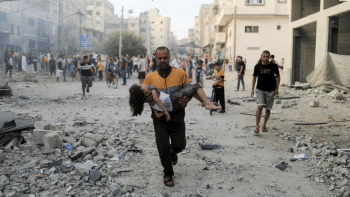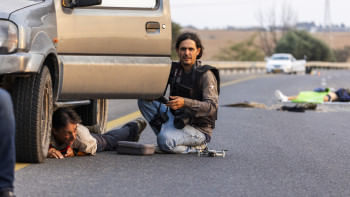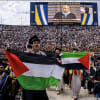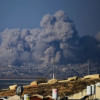The end of human rights and the last child in Gaza

Since October 7 last year, around 10,000 children have been killed by Israeli attacks carried out in the Gaza Strip in response to the deadly attack by Hamas on Southern Israel (which killed around 1,200). Moreover, since October 7, the Israeli government cut water and electricity supply to Gaza, closed its crossings with Gaza, and systematically obstructed the delivery of relief supplies to millions, nearly half of whom are children.
Amid truce calls and global demands for lasting ceasefire and sustained political solutions, Israeli Prime Minister Benjamin Netanyahu categorically said that Israel is "determined to continue all the way to the very end" until "there will be […] no one who will educate their children to annihilate Israel." With the spike in the number of innocent children being killed and affected, it appears Israel is on a mission to eradicate the last Palestinian with even the remote potential to "threaten" the existence of Israel.
To note, the entire international humanitarian law (laws of armed conflict) scheme is saturated with safeguards and protection of civilians, including children. Besides that, the international human rights law scheme also provides protections for civilians during armed conflict. At times, the two schemes intersect. For instance, Article 38 of the Convention on the Rights of the Child (CRC) provides that the states parties are obligated to respect and ensure respect for rules of international humanitarian law applicable to them in armed conflict, which are relevant to the child. Similarly, the same article of the CRC says that, in accordance with their obligations under international humanitarian law to protect the civilian population in armed conflict, states parties shall take all feasible measures to ensure the protection and care of children who are affected by an armed conflict. Indeed, beyond the stand-alone humanitarian law and human rights law obligations, there are human rights obligations to respect the norms of humanitarian law to protect children, among others, during armed conflict.
The optimist in me still tries to see the recent violations as a backdrop for reimagining the relevance of human rights in a new light. Similarly, the recent case brought to the International Court of Justice by South Africa, accusing Israel of violating the 1948 Genocide Convention, brings a ray of hope. However, the memory of the Ukraine versus Russia case at the ICJ undercuts such hope.
Like the rest of international law, the enforcement mechanism for the International Human Rights Law (IHRL) has historically been weak, characterised by weaker sanctions and deeper underpinnings of political naming and shaming on occasions of default. Against the backdrop of the current crisis, however, we ought to conduct a critical interrogation of the relevance of the overarching international human rights law framework itself.
The international human rights framework is underscored as "special" within the general public international law framework because it is non-synallagmatic in nature and grounded in "immanence" of the inalienable rights as opposed to the "voluntary" acceptance of obligations by the states. Indeed, with the inter-state communication submitted by Palestine against Israel for the alleged violations of Articles 2, 3, and 5 of the International Convention on the Elimination of All Forms of Racial Discrimination (ICERD) on Israel's part in the Occupied Palestinian Territories (the gravest being the violation of Article 3: racial segregation and apartheid), the ICERD committee held the view that, indeed, an array of human rights obligations is erga omnes (rights or obligations which are owed toward all), non-reciprocal, and objective in nature, while deciding in favour of Palestine on the question of admissibility and jurisdiction in view of prima facie evidence of a "generalised policy and practice" of racial discrimination against Palestine on the part of Israel. While the ICERD observation broke new ground in reimagining human rights in the occupied territories, and in locating Palestine within the spectrum of international human rights law schema in general, the recent turn of events makes it seem as though violations of human rights are the norm—and human rights compliance is merely a convenient placeholder for peace times, let alone something normatively "special."
Responding to the growing allegations against Israel of committing genocide in Gaza, the Israeli PM has repeatedly pointed the finger at the indiscriminate killings by Hamas on October 7. Commenting on the killings of innocent civilians, including children in Gaza by Israel, Netanyahu went on to say that while Israel is "doing everything to keep civilians out of harm's way, Hamas is doing everything to keep them in harm's way… It is Hamas, not Israel that should be held accountable for committing a double war crime—targeting civilians while hiding behind civilians." Interestingly, Netanyahu did not shy away from reminding the US of its own share of indiscriminate bombings and killings in the past. If Hamas is shown to have acted with an intent to use civilians (including children) in Gaza as human shields by forcing them to stay in the hostile zones (which is Israel's primary claim), they are certainly violating the prohibition against human shielding. Nonetheless, it should not relieve Israel of its own obligations towards civilians.
Had any of this happened in countries labelled as part of the Global South, perhaps the world would have witnessed an instance of humanitarian intervention (characterised by softer sanctions moving towards rather tougher breaches of sovereignty/territorial integrity). However, in the case of the genocidal killings now perpetrated by Israel, the world (and the West in particular) has not been quite as vigilant or humanitarian as it usually claims or seems to be. Indeed, a UN resolution demanding immediate humanitarian ceasefire taking note of the Article 99 invocation by the UN Secretary General was vetoed by the US. Thus, a rather modest humanitarian intervention, by means of effectuating a ceasefire, could not be sanctioned or put in place on unanimity by the states. This raises a few interrelated questions: does the human rights scheme really penetrate the veil of sovereignty? Or, when it comes to powerful states or states backed by powerful allies, does the human rights scheme lose its (theoretically) characteristic feature of doing so?
The grip of apartheid in the occupied territories (now more tightened than ever) exemplifies what the dark side of human rights really looks like.
The optimist in me still tries to see the recent violations as a backdrop for reimagining the relevance of human rights in a new light. Similarly, the recent case brought to the International Court of Justice by South Africa, accusing Israel of violating the 1948 Genocide Convention, brings a ray of hope. However, the memory of the Ukraine versus Russia case at the ICJ undercuts such hope. The ICJ, in quite an unprecedented way, ordered Russia to immediately suspend the military operations in the territory of Ukraine. However, Russia did not comply with the provisional measures order, citing previous noncompliance of other Western countries with ICJ's orders. Thus, if anything, the ICJ case and its order (even if it is positive with respect to Palestine) would perhaps only be academically beneficial. The indiscriminate bombings and arbitrary killings of civilians make it seem as though the human rights regime has not progressed at all or moved even a tad beyond its practical indeterminacies (in terms of enforcement); in the end, it has been all rhetoric—to be taken with a pinch of doctrinal salt.
The heading of this article is inspired by the title of Francis Fukuyama's seminal book The End of History and the Last Man, where Fukuyama describes Western liberal democracy as "not just… the passing of a particular period of post-war history, but the end of history as such: that is, the endpoint of mankind's ideological evolution…" The recent events, within the context of the Israel-Palestine war, appear not as just another passing of a period but as an episode potentially signalling the impending doom of an objectively trustworthy international human rights law scheme, particularly with five states at the helm as permanent members of the UN Security Council.
Indeed, it has become increasingly difficult to teach and study human rights at a time when the entire scheme could be reduced to virtually nothing and be subverted by pleading self-defence and geopolitics. As my students often ask: "why study human rights anyway?"
Psymhe Wadud teaches international human rights law at the University of Dhaka.
Views expressed in this article are the author's own.
Follow The Daily Star Opinion on Facebook for the latest opinions, commentaries and analyses by experts and professionals. To contribute your article or letter to The Daily Star Opinion, see our guidelines for submission.

 For all latest news, follow The Daily Star's Google News channel.
For all latest news, follow The Daily Star's Google News channel. 











Comments